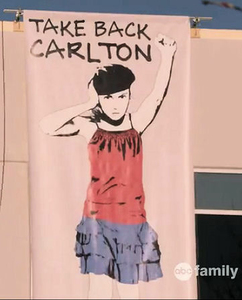
Features
Rants & Raves

TV Rants & Raves: Switched At Birth
Filed under: Rants & Raves
"But I'd never give up being deaf to be just like everyone else."
On the surface, Switched At Birth is a drama about worlds that collide together. Two teenage girls find their birth families, and everybody moves in together. Over time we see all sorts of social issues getting addressed, such as the differences of economic class, culture, and education, to name a few. The first season mostly had plots that centered around the characters having very poor boundaries, and finding themselves meddling into each other's lives in the most inconveniently intrusive ways possible. This second season still has plots that come from poor boundaries, but has a much stronger emphasis on the issue of deafness.
Before we get into the whole deaf thing, here is a short lesson (that will never be published in any textbook) on disability, and then on deafness, in order to put everything into perspective. In short, persons with disabilities usually cope with their crippled bodies in one (or more) of these three ways:
#1 - Minimize how bad the disability is;
#2 - Get mad at society (not to say that society does not deserve it); and/or
#3 - Pretend that having a disability is a good thing.
In the context of deafness, the deaf actually hate being thought of as being disabled. They can not stand euphemisms like "hearing impaired," and refuse to use politically correct terminology, such as person first language. This is why they insist that they be called a "deaf person." Refusing to view deafness as a disability, the deaf prefer to see it as an identity, a language, and a culture. To anybody with a sane mind, this is clearly a defense mechanism, consisting of denial, identification, and rationalization, all to soften the blow of not being able to hear. Still the deaf insist that it is absolutely not a disability. Yet, they (and the deaf characters on the show), all cope with their deafness in the ways of the disabled, in the short list of three ways above.
First, the rant.
The problem with the series mostly lies in the character of Melody, the deaf guidance counselor at Carlton (school for the deaf). This woman is a stubborn segregationist nut job. She resents having been forced to learn useful skills as a child, such as speech therapy and reading lips. Because she does not think that the deaf should have to do these things, she also does not like that her own deaf son wants these skills. On some level, this is some sort of a betrayal to the deaf community, an inability and unwillingness to have anything to do with the rest of society, and a distrust of the "hearies." Nope, no problem coming up with stupid labels for the normal able bodied, but the rest of society is not allowed to use terms that the deaf do not like.
Melody is the standard type of disabled person with huge amounts of emotional damage that comes from her disability, who copes with it by indulging herself in a disability rights movement. Or in the context of Melody, the deaf rights movement. People with disabilities who subscribe to these philosophies end up convincing themselves that there is nothing wrong with themselves, and that they have no related emotional issues that need to be resolved. Not only that, the teachings of these philosophies provide them with all the right answers to make themselves feel better, even if these answers are sometimes wrong and maladaptive. So leave it to Melody to get into a field where her deafness and mental health are not seen as a weakness, but as an asset. In her field, she is now a first hand experience know-it-all who is paid to proselytize her closed mind to the younger generation.
Where Melody really crossed the line was in the classroom setting. To anybody that knows anything about pedagogy, the scene where she forced her delusions down the students' throats was just scary. Melody did it in a very devious way too. It was so devious that she did not even realize it, because her own self-absorbed sense of good intentions blind her from the truth and the necessity to teach students how to think for themselves. Since she was not capable of the latter, she did the thinking for them. To her credit, she was actually quite skilled at the art of indoctrinating the deaf children in her class. Melody took the students from victim to (a false sense of) empowerment. She pointed out that society had considered them to be inferior due to their hearing loss. She then asked if anybody in the class would like to wake up tomorrow with hearing, which nobody in the class wanted to. Now that is screwed up. The students were asked to come up with their own reasons why, and to share it with the class. Melody understood the power of peer pressure and used it on the students to reinforce her own beliefs of what deafness is. As she put it, "Not hearing loss. Deaf gain."
|
Have a hard time believing that somebody would pretend that having a disability is a good thing? Here, take a look at the screen captures if you are still incredulous. (Image capped from "Human / Need / Desire.") |
 |
Daphne was somewhat reluctant to buy into Melody's reframing about the advantages of being deaf. But like most disabled people, it is not because of Daphne's own disability. Rather, it was because of how the ignorant society treated her, with the most recent incident being a robbery that she felt only happened because of her deafness. To Melody this is just one of the costs of having the benefits of deafness.
Just who is Melody fooling anyways? The answer is simple. The viewer. Scenes such as the one in the classroom are the not-so cleverly disguised attempts on the show's part to spread misguided deaf rights movement into our living rooms. There is nothing inherently wrong with having a character like Melody on the show, as there do happen to be lots of deaf people that are in strong agreement with Melody's radical stance. But where the problem lies, is that Melody is the character the show uses to indoctrinate not just the classroom, but the viewers that tune in to buy into all the nonsense. At the end of the day, Melody is still a person with a disability, that copes in the way of persons with disabilities. Yet, not only does she not believe she is disabled, but also wants everybody to see how much better off she is because of her deafness.
Now the rave.
Somewhere in the last couple of decades, all the social workers, disability advocates, educators, families, and do-gooders, have decided that mainstreaming kids with disabilities was one of the best things to do. It would push the system away from the old institutionalization and rehabilitative models, and into the direction of integrative community living. The idea was that kids that are disabled should do everything that able bodied kids do, and that the disabled should not be locked away from society. In the context of education, that meant that there should only be one kind of school. Not two kinds of schools -- one for the able bodied, and one for the disabled. Presently, the momentum is in the direction of mainstreaming, as the bleeding heart decision makers of our Western society have been adamant that the disabled should not be separated, and that kids need to learn about disability from having a a disabled student in the classroom. On the odd occasion, this makes sense. But there are also a lot of times when mainstreaming does not work.
This is where Switched at Birth deserves credit for taking a stance against mainstreaming deaf kids. When the deaf students of Carlton talk about the miserable times they had in the regular school, those lines that they sign are not something that a writer just made up. Those lines are filled with truth, hurt, and sense. The students know about the ostracization, isolation, and being seen by everybody else as the deaf kid that needs to be followed around all over by an interpreter. At Carlton, none of that happens. The students get to be themselves with other students that are no different. Nobody at Carlton is the deaf kid. None of them have to be there to expose disability to the kids that know nothing about disability. Everybody at Carlton knows this, which is why they become very protective of Carlton. First at the pilot program to bring hearing kids in, and then they get very angry at the announcement that Carlton would be closing because of financial reasons. Much of their stance was over society not giving a damn and preferring to fund other regular schools over Carlton, as Daphne pointed out. Whether there is much truth in Daphne's speech to the school board is not the issue here. What is important is that the deaf just want a place to call their own.
At the end of it all, the viewer is left with a bit of a mixed message. On one hand, Melody extolled the virtues of deafness. But on the other hand, the students have real issues about how much of a burden being deaf is. So if deafness is so great (as Melody put it), then why are tax payers expected to pay for somebody with "deaf gain," to have their own place? The problem here is Melody's inability to admit that deafness is indeed a bad thing, a disability, or for that matter, for her to shut the hell up about the perks of deafness. What wheelchair user would not want to wake up tomorrow being able to walk again? Or what blind person would not want to see? But somehow, Melody thinks that deaf life is so great, that she and the students would not want to have hearing. If the deaf want to get some sort of social services, they need to stop being in denial that they have a disability, and admit to the physical difficulties of being deaf. A universal clear message, with a clear emotion attached to it is a lot more helpful than the mixed messages that are being sent out.
All this is not limited to just the deaf. Lots of persons with disabilities fall into the cliché of gloating about how great their lives are, in order to help themselves get through the day. Maybe that is just their way of crying out for help. Agree or disagree? Either way, come to our facebook page to occupy it like Carlton.
Tags: Switched At Birth, Vanessa Marano, Katie Leclerc, Constance Marie, Lea Thompson, D. W. Moffett, Lucas Grabeel, Gilles Marini, Uprising, Marlee Matlin

SBM on Social Media